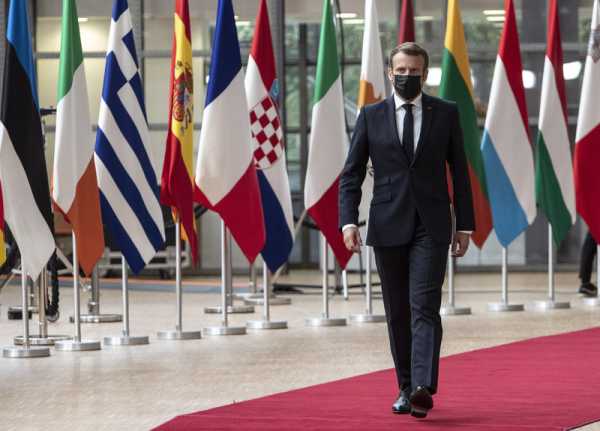
The European Council, with its 27 vetos, may have worked fine for a union of the six founding member states in the 1950s, but it has become sclerotic and dysfunctional (Photo: consilium.europa.eu)
President Emmanuel Macron has laid out the agenda for his country’s six months at the helm of the Council of the European Union. In his address to the European Parliament, he championed a bold and ambitious pro-European agenda. Europe needs boldness and, indeed, ambition.
There is however one big obstacle: a system of governance that has gridlocked the EU for over a decade. The so-called ‘intergovernmental’ method of 27 national governments dealing behind closed doors has proven unable to tackle even relatively surmountable challenges. This is a bad omen for the ambitions expressed now.
The French EU presidency’s agenda perfectly reflects the current European moment.
Taboos on a more powerful European Union are melting away faster than glaciers in the Alps. Think eurobonds; an expanded EU budget; and European public health. European defence is no longer an anathema. These new European powers are the logical response to external challenges, be it pandemic or Putin.
Fair warning: do not expect these transfers of power to materialise in the real world any time soon.
The reason for this lies with how the European Council operates.
Sclerotic and dysfunctional
This Council consists of the government leaders of all 27 EU member states, each with its own veto. The intergovernmental system they maintain may have worked fine for a union of the six founding member states in the 1950s, but it has become sclerotic and dysfunctional.
Hence the lack of agreement on virtually anything, whether it be geopolitics; migration; the rule of law; climate policies; or Covid-19 measures. What is worse, this system has allowed EU member states to break the law routinely, doing ever-greater damage to the EU’s foundations.
The European Council, for all its sclerotic dysfunctionality, is powerful, but it is accountable to nobody.
There is, however, the European Commission that, as “guardian of the EU Treaties”, enforces the body of EU law that all member states have agreed to obey. As such, the commission has to take national governments to court in case of non-compliance.
This already weak check on power has all but vanished. In a recent study, two scholars from Rutgers University in New Jersey demonstrated how the commission has deliberately relinquished its enforcement task years ago. It applies something called “forbearance” instead.
In essence, the commission now avoids conflict with member state governments when they break the law. Instead of being a guard dog for the European common interest, the European Commission is thus acting more like the lapdog of the European Council and its individual members.
This is in violation of the European Commission’s treaty-mandated independence. While the aforementioned body of EU law is growing, enforcement is in steep decline, putting the entire EU architecture on a loose footing.
Meanwhile, the European Parliament – like many parliaments during the pandemic – has gone quiet.
Together with the commission and council, it forms a constellation of three large EU institutions. The parliament is a formidable legislator that churns out standard-setting laws, but it has ceased to act as a forceful parliamentary watchdog.
It fails to hold the commission to account for failing to live up to its treaty-obligations. With both parliament and commission retreating into passivity, there remain no checks on the powerful council. Thus reverting Europe to an almost undiluted form of inter-governmentalism. The national governments’ preferred system of governance.
Proponents of this system say that Europe is a sui generis ‘project’ that does not have to meet fundamental democratic requirements. This is nonsense.
The EU may be a ‘sui generis’, hybrid entity, but it ceased to be a mere ‘project’ long ago. Europe is a political entity; and politics in Europe should be democratic. Democracy is a system, based on the separation of powers; checks and balances; accountability and transparency.
Those elements are absent in the current governance structure of the EU. The addition of a directly elected parliamentary branch to the intergovernmental “trunk” of the EU tree does not automatically make it a democracy.
The European parliament, directly elected by the people since 1979, should lead the way by demanding the EU rapidly grow up and become a mature democracy. New competences sorely need a corresponding transfer of democratic accountability. Europe must become a full-fledged parliamentary democracy.
Over the past years, Europeans have grown concerned with the attack on democracy in the United States. They should be equally worried about the state of democracy in the European Union, which is far less mature than its American equivalent.
Not only that; it is deteriorating. Power in Europe is becoming more intergovernmental and less democratic. This makes the EU less able to fend off challenges to its democratic foundations. Also in practical terms, intergovernmentalism is a dead-end street for Europe.
The world today is a very inhospitable place for the giant on clay feet that the EU has grown into. The external pressures that drive the EU’s agenda will not recede soon.
At some point the EU must deliver on its agenda for dealing with these pressures. It is high time for a radical breakthrough into a fully-fledged EU parliamentary democracy. Intergovernmental Europe is yesterday’s Europe: neither nimble nor legitimate enough for the present.
Source: euobserver.com



